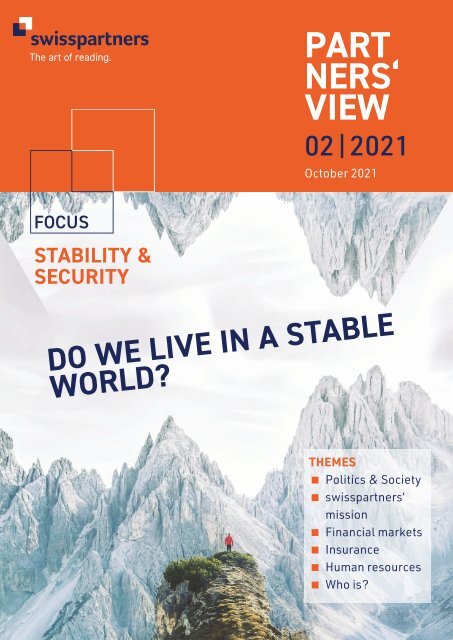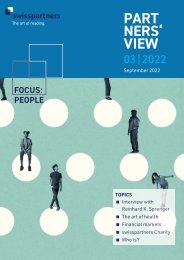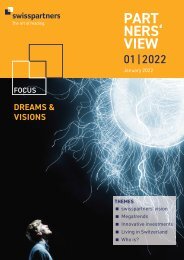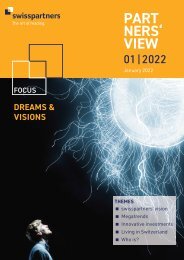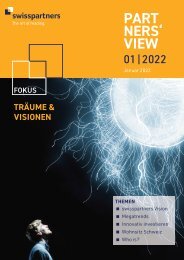Partners' View 2|2021 english
You also want an ePaper? Increase the reach of your titles
YUMPU automatically turns print PDFs into web optimized ePapers that Google loves.
The art of reading.<br />
PART<br />
NERS‘<br />
VIEW<br />
0<strong>2|2021</strong><br />
October 2021<br />
FOCUS<br />
STABILITY &<br />
SECURITY<br />
DO WE LIVE IN A STABLE<br />
WORLD?<br />
THEMES<br />
< Politics & Society<br />
< swisspartners’<br />
mission<br />
< Financial markets<br />
< Insurance<br />
< Human resources<br />
< Who is?
PART<br />
NERS‘<br />
VIEW<br />
0<strong>2|2021</strong><br />
STABILITY &<br />
SECURITY
EDITORIAL<br />
S<br />
Society’s perception of stability and<br />
security has continued to evolve over<br />
the past decades. They are both<br />
indispensable factors, even when it<br />
comes to forward-looking themes such<br />
as digitalisation or automation.<br />
While for those living in third-world<br />
nations or war zones, the overriding<br />
priorities remain essential provisions<br />
or survival, other countries place<br />
greater importance on political stability<br />
or the quality of healthcare. Over time,<br />
the needs of each and every one of us<br />
adapt to our life cycle and<br />
circumstances.<br />
When it comes to financial advice and<br />
the stability and security of<br />
investments, we at swisspartners<br />
have supported wealthy individuals for<br />
almost 30 years, always endeavouring<br />
to tailor our services to their individual<br />
needs.<br />
What is the significance of stability and<br />
security for financial services, politics<br />
and society? Adrian Hasler, who is a<br />
member of the Board of Directors of<br />
swisspartners AG, Liechtenstein,<br />
provides thought-provoking answers to<br />
this question in this issue’s editorial.<br />
Dr Martin Meyer, swisspartners<br />
Group’s new Chairman since May 31,<br />
2021, talks about the advantages<br />
provided by Switzerland, the safety of<br />
investments in turbulent times and the<br />
importance of prioritising our clients’<br />
needs in our interview with him.<br />
Our CIO, Peter Ahluwalia analyses the<br />
spectre of inflation while Stefan<br />
Bischofberger of swisspartners<br />
Insurance explains the benefits of<br />
insurance as an investment option for<br />
wealthy private clients. Vanessa<br />
Burkart, our Partner responsible for<br />
managing our Human Resources draws<br />
the conclusion that there can be no<br />
security for our clients without our<br />
people. In a similar vein, this issue’s<br />
WHO IS? features another key member<br />
of the swisspartners team.<br />
I hope you enjoy reading the second<br />
edition of the redesigned Partners’<br />
<strong>View</strong>!<br />
Yours<br />
Markus Wintsch<br />
CEO, swisspartners Group<br />
PARTNERS‘ VIEW | Editorial 3
CONTENTS<br />
4 Contents | PARTNERS‘ VIEW
HOW STABLE IS OUR WORLD? 6<br />
Commentary from Adrian Hasler<br />
OUR GOALS IN FOCUS 9<br />
Interview with Dr Martin Meyer<br />
BACK TO THE FUTURE 12<br />
Financial markets analysis by Peter Ahluwalia<br />
INSURANCE –<br />
FINANCIAL PEACE OF MIND 14<br />
By Stefan Bischofberger<br />
PEOPLE POWER 16<br />
Vanessa Burkart on individuals as the key to innovation<br />
WHO IS? 18<br />
Five questions to Othmar Büeler<br />
IMPRINT 19<br />
PARTNERS‘ VIEW | Contents 5
HOW STABLE IS OUR<br />
WORLD?<br />
DIE THE BEDEUTUNG IMPORTANCE VON OF STABILITY STABILITÄT AND UND<br />
SICHERHEIT SECURITY FOR FÜR THE FINANZWIRTSCHAFT,<br />
FINANCIAL<br />
POLITIK SECTOR, UND POLITICS GESELLSCHAFT AND SOCIETY<br />
A COMMENTARY FROM ADRIAN HASLER<br />
I<br />
If we consider the events of the last decade, it is clear that we<br />
live in a period of major change – be it political transition,<br />
climate change or the ongoing pandemic. On the one hand,<br />
these dynamic shifts create new opportunities, but on the other<br />
they are also a source of great uncertainty in our society. For<br />
this reason, values such as stability and security are becoming<br />
increasingly important, as I will illustrate in the following two<br />
examples.<br />
EXAMPLE 1:<br />
EUROPEAN FINANCIAL MARKET REGULATION<br />
The international environment for financial service providers<br />
has fundamentally changed in the last twenty years. In the<br />
wake of the 2007/2008 financial crisis and the subsequent<br />
economic crises, systemically important banks and even some<br />
national governments had to be bailed out. These measures<br />
took a severe toll on public finances globally – and sparked<br />
immense uncertainty in society as a whole. International<br />
organisations created new regulations to prevent similar<br />
developments from occurring again in the future. The aim of<br />
these regulations was to eliminate any systemic shortcomings<br />
identified to date, and to enhance the stability of the system.<br />
The EU has bolstered these international developments and<br />
raised standards even further, while making it difficult for third<br />
countries to access the European market.<br />
6 Main feature – Stability & Security | PARTNERS‘ VIEW
„ Stability and security<br />
are extremely<br />
important geographic<br />
advantages,<br />
especially in times<br />
of major regulatory<br />
and political<br />
upheaval.”<br />
LIECHTENSTEIN AS A FINANCIAL CENTRE<br />
Unrestricted access to the European market is of crucial<br />
importance to Liechtenstein as a member of the European<br />
Economic Area (EEA). This also means that Liechtenstein has<br />
to adopt European financial market regulations and has very<br />
little room to manoeuvre when it comes to implementing them<br />
in a specific context. There is no doubt that the onslaught of<br />
regulation presents significant challenges for financial service<br />
providers and will continue to do so in the future. At the same<br />
time, the regulatory environment presents an opportunity for<br />
the Liechtenstein financial centre, as rules that apply at a<br />
multilateral or global level create legal certainty and ensure a<br />
fair competitive environment – both of which are hugely<br />
important, especially when managing international wealth. This<br />
offers financial service providers scope to set themselves apart<br />
from their peers in other locations.<br />
Liechtenstein is a broadly diversified financial centre and has<br />
extensive expertise in international and cross-border wealth<br />
management services. Stability and security are extremely<br />
important geographic advantages that are increasingly sought<br />
by international clientele, especially in times of major regulatory<br />
and political upheaval.<br />
ABOUT ADRIAN HASLER<br />
THE ART OF REAL ESTATE<br />
Adrian Hasler is a member of the Board of Directors of<br />
swisspartners AG, Vaduz, Liechtenstein. As Prime Minister<br />
of the Principality of Liechtenstein from 2013 to 2021, he<br />
was responsible for the Ministry of General Government<br />
Affairs and Finance. After studying business administration<br />
at the University of St. Gallen, Adrian held various<br />
management roles in industry and banking. He was Head<br />
of Controlling of the Thin Films division of Balzers AG<br />
from 1992 to 1996 and the Head of Group Finance at VP<br />
Bank in Vaduz from 1996 to 2004. From 2001 to 2004,<br />
Adrian was an MP and a member of the Finance Commission<br />
in the parliament of Liechtenstein. He became chief of the<br />
Liechtenstein National Police in spring 2004 and led the<br />
authority for nine years before being elected Prime<br />
Minister of Liechtenstein in 2013.<br />
adrian.hasler@powersurf.li<br />
PARTNERS‘ VIEW | Main feature – Stability & Security 7
„<br />
We have<br />
to become more<br />
crisis-resistant.”<br />
EXAMPLE 2:<br />
EFFECTS OF THE CORONAVIRUS PANDEMIC<br />
The world has been at the mercy of the coronavirus pandemic<br />
since March 2020. The repercussions on society as well as on<br />
various sectors of the economy are not yet fully quantifiable.<br />
Will we ever return to normal – and how will the new normal<br />
look? Or have we reached a turning point? It will probably be<br />
some time before we know the answers to these questions.<br />
However, the deep uncertainty that the pandemic has caused<br />
is already clearly visible within society. Many parts of the world<br />
were unprepared for the coronavirus pandemic when it struck.<br />
As a result, countries have taken very different – in some cases<br />
even opposing – approaches to managing the crisis. This has<br />
also added to the confusion. Ensuring stability and security is<br />
a requirement that governments have to meet, especially in<br />
times of crisis.<br />
LESSONS FROM THE PANDEMIC<br />
What have we learned from the pandemic? It has become clear<br />
that both societies and economies are less robust than we<br />
thought. Much of what we took for granted is suddenly no<br />
longer guaranteed. Any weak points that we were aware of<br />
have been magnified by the pandemic. These are the aspects<br />
we must tackle in order to strengthen our resilience. In other<br />
words, we have to become more crisis resistant.<br />
It is vital that we identify trends and developments early, draw<br />
the right conclusions and implement necessary changes in a<br />
timely manner. More specifically, this means being better<br />
prepared for future pandemics based on various scenarios<br />
being simulated by crisis management teams at regular<br />
intervals. Any identified weaknesses can then be rapidly<br />
eliminated. It is also important to improve and ensure<br />
co-ordination between European countries. Going it alone to<br />
the detriment of neighbouring countries must be avoided as<br />
far as possible. Different procedures at borders (such as<br />
border closures), for example, have led to misunderstandings,<br />
particularly in the region of Lake Constance. Open borders and<br />
proactive exchange are crucial factors that keep the European<br />
Economic Area alive. For this reason, it is also important to<br />
consider regional interests. Equally, I expect EU nations to fulfil<br />
their contractual obligations, even in periods of crisis. In my<br />
view, restrictions or blocks on exports are not appropriate and<br />
serve to erode confidence.<br />
The last 18 months have taught us that there is more solidarity<br />
than we have historically been accustomed to. This is very<br />
encouraging and suggests that there is a good chance that we<br />
will maintain and foster this sense of social cohesion in the<br />
future. What it has shown me is that reliability is invaluable,<br />
especially in times of crisis. I consistently strived to uphold<br />
these values during my time as Prime Minister. I experienced<br />
first-hand how important it is for the public to have a<br />
government that takes a clear and decisive approach to<br />
steering the country through crisis. This has a stabilising effect<br />
on a society that craves security in highly challenging times.<br />
„<br />
Reliability is<br />
invaluable, especially<br />
in times of crisis.”<br />
8 Main feature – Stability & Security | PARTNERS‘ VIEW
OUR GOALS<br />
IN FOCUS<br />
DR MARTIN MEYER HAS BEEN THE<br />
NEW CHAIRMAN OF THE BOARD OF<br />
SWISSPARTNERS GROUP SINCE<br />
MAY 31, 2021. HE SUCCEEDS<br />
MARTIN P. EGLI, WHO<br />
SUCCESSFULLY SHAPED THE<br />
GROUP’S GROWTH FOR SOME<br />
30 YEARS. WE SPOKE TO DR MEYER<br />
ABOUT CRITERIA FOR STABILITY<br />
AND SECURITY, HIS EXPERIENCE IN<br />
POLITICS AND BUSINESS AND HIS<br />
OBJECTIVES FOR SWISSPARTNERS.<br />
Interview by Kathrin Meister.<br />
Dr Meyer, how can swisspartners offer its clients secure<br />
solutions even in turbulent times?<br />
swisspartners is in an excellent position to ensure that clients<br />
continue to benefit from a long-term and stable business<br />
relationship into the future. Highly qualified, motivated staff, a<br />
track record of expertise in wealth management and wealth<br />
structuring, excellent performance and a consistent willingness<br />
to keep developing and adapting to new trends – these are and<br />
will remain some of the key factors underlying our success that<br />
we can extend to clients, now and in the future.<br />
How significant is the fact that the group is based in<br />
Switzerland?<br />
swisspartners benefits from being able to offer our services<br />
into international markets from our base in Switzerland, and<br />
into the EU from our office in Liechtenstein. We can operate<br />
within an economic area and customs union benefitting from<br />
political stability. This also enables us to offer our clients a high<br />
level of legal certainty. We can provide stable, cross-border<br />
solutions at all times. Clients wishing to have their wealth<br />
managed or structured in Switzerland or Liechtenstein in line<br />
with an asset protection approach, as well as those embarking<br />
on estate and succession planning, can rely on watertight state<br />
guarantees. In times of global political uncertainty, this puts<br />
Switzerland at a huge advantage. Thus “Swissness” epitomises<br />
stability and security.<br />
PARTNERS‘ VIEW | swisspartners‘ mission 9
In view of current events, many investors are wondering<br />
whether their assets are still safe. Would you say that clients<br />
of swisspartners can still sleep well at night?<br />
As a business, we have an outstanding set-up. We have a<br />
stable shareholder base that has set long-term goals. We have<br />
a strong capital ratio, similar to that of large private banks in<br />
Switzerland and Liechtenstein, which is also a sign of security<br />
and stability for clients. And, as I mentioned earlier, our highly<br />
qualified, experienced and motivated professionals provide a<br />
top-quality service.<br />
As the new Chairman of wisspartners Group, what issues are<br />
you focusing on?<br />
Having had numerous discussions with staff at swisspartners<br />
and carried out my own analyses, I’ve identified three main<br />
areas that I’d like to focus on in my work for the group.<br />
1. As a matter of principle, the needs of our clients always come<br />
first for me. Without clients, we as an organisation would be<br />
redundant. The requirements of the people we serve are going<br />
to evolve, so we have to shift our focus to also meet the needs<br />
of an additional, younger generation of clients. At the same<br />
time, we will continue to develop innovative services and bring<br />
them to the market. We want to add value for our clients –<br />
above and beyond the scope of conventional wealth management.<br />
We have no intention of standing still, but rather will strive to<br />
motivate our team to keep learning about relevant topics.<br />
2. What I’ve learnt in my first 100 days as Board Chair: the<br />
coronavirus pandemic, and the long period it triggered of<br />
people working from home, wasn’t great for our corporate<br />
culture. We are committed to fostering a common team spirit<br />
and sense of togetherness amongst our people, for example<br />
by holding team events.<br />
3. To make sure we future proof our business, we need to live<br />
a continuous change process. This includes optimising operational<br />
processes and keeping pace with digitalisation. In addition, we<br />
are striving to implement attractive succession plans for our<br />
longstanding relationship managers for all parties concerned<br />
– former relationship managers, their successors and, of<br />
course, our clients.<br />
You just spoke about innovative products with which<br />
swisspartners can address the needs of a younger generation<br />
of clients. Can you give us an example?<br />
The stress-free package is one such solution that we have<br />
developed. It stands out because it offers more than just<br />
conventional wealth management, instead encompassing a<br />
holistic service offering. As part of the stress-free package, we<br />
support our clients across a broad range of themes, from<br />
financial planning and tax issues to retirement solutions, estate<br />
planning and lifestyle services. The stress-free package has<br />
one major advantage: clients have a single point of contact who<br />
provides advice on – and takes care of – all aspects of their<br />
finances and retirement provisions.<br />
Regarding “asset protection”: what solutions do you provide<br />
for sustainable asset management?<br />
When financial market participants talk about “sustainable<br />
solutions”, what they mean is that wealth is not just managed<br />
for one generation, but rather across multiple generations.<br />
Thanks to the outstanding position we are in, we at swisspartners<br />
can provide solutions geared to the long term, extending<br />
beyond a single generation or single phase of life. I’m thinking<br />
of smart fiduciary solutions tailored towards asset protection<br />
and wealth structuring or succession and estate planning. This<br />
is the best way to structure and manage wealth over multiple<br />
decades.<br />
10 swisspartners‘ mission | PARTNERS‘ VIEW
„ Without clients, we as an<br />
organisation would be redundant.”<br />
Dr Martin Meyer<br />
Chairman of the Board of swisspartners Group<br />
martin.meyer@swisspartners.com<br />
One more question to finish off – a personal one this time: how<br />
is your experience in politics relevant to business and the<br />
financial markets?<br />
My political career was good preparation for business. At the<br />
age of 32, I was one of the youngest ministers in the Principality<br />
of Liechtenstein. When you take up a post in government, you<br />
gain a lot of experience in dealing with a wide range of<br />
stakeholders and issues, from EU regulations to digitalisation<br />
and other megatrends. These are issues that transcend politics<br />
and are now more relevant to the private sector than ever<br />
before.<br />
An understanding of how politics approaches issues such as<br />
these and identifies possible solutions can be extremely useful<br />
in the private sector. If you understand how political processes<br />
work, you’re at an advantage as you can save time and effort<br />
by focusing directly on the issues that matter most to<br />
businesses.<br />
„ Fiduciary solutions are an<br />
ideal way to structure and<br />
manage wealth over multiple<br />
decades.”<br />
THE ART OF ABOUT REAL ESTATE MARTIN MEYER<br />
Martin Meyer holds a doctorate in economics from the<br />
University of Bern and, as CEO, currently heads the<br />
family office of the ITW group of companies, which is<br />
headquartered in Liechtenstein. ITW is privately held and<br />
makes real estate and corporate investments.<br />
From 2005 to 2013, Dr Meyer was a member of the<br />
government of the Principality of Liechtenstein, holding<br />
positions including Minister of Economic Affairs and<br />
Deputy Prime Minister. He now specialises in corporate<br />
governance, corporate leadership, entrepreneurship,<br />
family businesses and succession planning. Dr Meyer sits<br />
on various boards of international industrial and financial<br />
services companies.<br />
In addition, he has been Honorary Consul of the Federal<br />
Republic of Germany for the Principality of Liechtenstein<br />
since 2016. He has been the President of the Liechtenstein<br />
Chamber of Commerce, which is the largest business<br />
association in the country since 2021.<br />
PARTNERS‘ VIEW | swisspartners‘ mission 11
„ There<br />
BACK TO THE FUTURE!<br />
FINANCIAL MARKETS ANALYSIS BY PETER AHLUWALIA<br />
Inflation is as violent<br />
as a mugger, as<br />
frightening as an armed<br />
robber and as deadly as<br />
a hit man.”<br />
RONALD REAGAN, 1978<br />
has been an inordinate amount of nonsense talked<br />
about in the markets since the advent of 24/7, 365 days a<br />
year financial coverage. From my rather no-nonsense and<br />
pragmatic perspective, it often seems as if people revel in<br />
making things unnecessarily complicated.<br />
A prime example is the recent decline in the 10-year US<br />
Treasury bond yield from 1.75% to around 1.30%, which has<br />
prompted many market observers to come up with all sorts of<br />
interesting theories. But might this story actually be fairly<br />
simple? With so many people all positioned the same way for<br />
US Treasury yields to rise, it wasn’t going to take much to move<br />
the needle the other way as investors with leverage quickly<br />
found themselves on the wrong side of the trade. I fully expect<br />
US 10-year Treasury yields to finish the year at around the 2%<br />
level. To put this into perspective, the last time inflation<br />
readings were this high the Fed funds rate was at 4.75% and<br />
the 10-year US Treasury was yielding over 7%. This move will<br />
no doubt lead to some excitement in the second half of the year.<br />
12 Financial Markets | PARTNERS‘ VIEW
PETER AHLUWALIA<br />
PARTNER<br />
Chief Investment Office<br />
peter.ahluwalia@swisspartners.com<br />
STOP GAMBLING<br />
Another major contributor to the enhanced volatility which I<br />
expect in the second half of the year is the overall make-up of<br />
the market. The advent of ETFs with and without leverage,<br />
stimulus cheques and excess liquidity means that many<br />
financial markets have turned into the equivalent of sports<br />
betting, where people are able to place their bets quickly and<br />
cheaply without much in the way of a thought process. The<br />
overall market make-up, with the vast majority of people<br />
never having witnessed inflation and ensconced in a belief in<br />
permanent deflation, could also contribute to gut-wrenching<br />
volatility.<br />
Everywhere I have travelled in Europe I have seen nothing but<br />
people enjoying themselves without a thought for the cost or<br />
the weather. Is it really possible that in just a few months<br />
people could have made up for all the activities they had<br />
planned but had to forego? I get the same feedback from clients<br />
all across the world, who tell me they are seeing an economic<br />
boom driven by pent-up demand, high savings rates and<br />
animal spirits.<br />
Economic growth in developed markets is likely to be at levels<br />
we have not seen for decades, with the US economy growing<br />
8% this year and then 6% next year. Europe, meanwhile, is<br />
expected to grow by 5% each year. I would not be surprised if<br />
there is actually upside to both numbers. Amidst such strong<br />
economic activity, it is only reasonable and logical to expect<br />
higher inflation as well.<br />
Which brings us very neatly to what is perhaps the biggest risk<br />
in markets.<br />
AN UNFORCED POLICY ERROR BY CENTRAL<br />
BANKS<br />
Central banks are effectively walking a high wire above an<br />
abyss filled with crocodiles – none more so than the US<br />
Federal Reserve. It will require some nimble footwork and fine<br />
balancing to avoid a fatal accident.<br />
The good news is that there is still some time left. That said,<br />
the window is narrowing.<br />
While it is highly commendable for central banks to let<br />
economies run hot in order to make up for lost output during<br />
the pandemic and also for the years when economies were not<br />
growing, there is a very real danger that inflation could get out<br />
of control, with economic growth going supernova and the<br />
central banks ultimately hurting the very people they are trying<br />
to help – those at the lower end of the income scale, who are<br />
more exposed to inflationary pressures.<br />
While I do not believe that inflation numbers will continue<br />
at the same velocity we have seen recently, we should be<br />
prepared for a higher final level of inflation over the longer<br />
term (let`s call it 3.5%). In return, however, we are likely to<br />
experience higher economic growth rates than we have seen<br />
over the last decade.<br />
CALORIE COUNTING<br />
Prices of major agricultural commodities have surged over the past 12 mohths.<br />
Soybean oil<br />
Ethanol<br />
Lean hogs<br />
Corn<br />
Palmoil<br />
Arabica coffee<br />
Soybean<br />
Sugar<br />
Soybean meal<br />
Wheat<br />
Live cattle<br />
Whole milk powder<br />
Feeder cattle<br />
Rough rice<br />
8%<br />
24%<br />
22%<br />
21%<br />
20%<br />
15%<br />
62%<br />
59%<br />
56%<br />
54%<br />
47%<br />
74%<br />
73%<br />
124%<br />
Source: Bloomberg<br />
PARTNERS‘ VIEW | Financial Markets 13
INSURANCE –<br />
FINANCIAL PEACE<br />
OF MIND<br />
SOLUTIONS FOR<br />
WEALTHY PRIVATE CLIENTS<br />
BY STEFAN BISCHOFBERGER<br />
Insurance dates back to the Middle Ages. In Old Germanic<br />
communities, the first guilds were established in the medieval<br />
era. They offered their members support for events such as<br />
illness, theft, loss of livestock, fires and bereavement. This type<br />
of cover has survived to this day, especially with regard to<br />
insuring against risks. Insurance is rooted in the principle of<br />
solidarity within a defined group of people. As time has gone<br />
on, a further element has been added to the traditional concept<br />
of insurance protection – saving as a way of making financial<br />
provision for later in life.<br />
SAVING: INSURANCE OR WEALTH<br />
MANAGEMENT?<br />
There is no fundamental difference between saving via an<br />
insurance policy and wealth or asset management – both<br />
models can be used to make financial provision, as well as to<br />
build and safeguard wealth.<br />
That said, from the regulatory perspective insurance offers<br />
significant advantages. The state has an interest in ensuring<br />
that all its citizens, as well as drawing on state pensions and<br />
social security, also take out relevant insurance cover to<br />
provide for themselves. As a result, governments frequently<br />
offer incentives to policyholders in the form of tax breaks.<br />
At the same time, the state imposes strict rules on the<br />
insurance industry. Insurers are subject to rigorous and<br />
recurring supervision when it comes to criteria such as<br />
solvency, reserves, levels of cover and financial obligations.<br />
The fundamentally stringent approach adopted by the state<br />
towards the industry can almost be seen as a guarantee of<br />
insurers’ security.<br />
INSURANCE POLICIES FOR WEALTHY PRIVATE<br />
CLIENTS<br />
Over the past 15 to 20 years, international insurers have<br />
specialised in the wealthy private clients segment. Like all<br />
other policyholders, affluent clients also benefit from the<br />
advantages of using insurance policies for savings purposes.<br />
As I outlined above, regulators consider an investment within<br />
an insurance policy to be a form of financial provision. As a<br />
result, the state grants incentives in the form of tax breaks<br />
while ensuring regulatory supervision, irrespective of the sums<br />
held within the insurance policy.<br />
Insurance solutions for wealthy private clients can be divided<br />
into two groups.<br />
1. COMBINING AN INSURANCE POLICY WITH<br />
OUTSOURCED WEALTH MANAGEMENT<br />
This solution is predominantly used for succession and tax<br />
planning. These policies incorporate no – or very little –<br />
conventional (biometric) life insurance risk. However, they are<br />
structured such that they are deemed to be a form of life<br />
insurance – with the attendant tax breaks – as far as the<br />
regulatory and tax authorities are concerned. This type of<br />
insurance has become firmly established for European clients<br />
who are also domiciled in Europe. The providers are generally<br />
companies whose registered office is in Liechtenstein, Luxembourg<br />
or Ireland, while some are domiciled in other EU member<br />
states or overseas. These policies can be offered under rules<br />
covering the freedom to provide services within the EU.<br />
14 Insurance | PARTNERS‘ VIEW
2. CONVENTIONAL LIFE INSURANCE WITH HIGHT<br />
BIOMETRIC LIFE RISKS<br />
This group is classified as conventional insurance in that the<br />
policies combine retirement or savings capital with a high level<br />
of insurance cover. They are mainly used for liquidity and<br />
succession planning. Policyholders can also take advantage of<br />
tax breaks in many countries, irrespective of whether the<br />
policies are deemed to qualify as insurance for regulatory or<br />
tax reasons. The insurance company is in charge of investing<br />
the assets. The providers are companies whose registered<br />
office is located overseas, and the offering is targeted towards<br />
clients whose tax domicile is outside the EU.<br />
CONCLUSION: INSURANCE POLICIES HAVE<br />
NUMEROUS ADVANTAGES<br />
Individuals who decide to put their investments or savings into<br />
an insurance policy can be certain that this option offers<br />
security and stability at all times. The benefits are obvious:<br />
▪ Policyholders enjoy tax breaks.<br />
▪ Conventional investment products, such as those<br />
distributed by banks, can be combined with insurance.<br />
▪ Policies covering high biometric life insurance risks are<br />
available.<br />
▪ There are established companies that offer insurance<br />
policies with outsourced wealth management.<br />
▪ Insurers that cover high biometric life insurance risks<br />
have generally been in business for over 100 years and<br />
are rated AA- by S&P.<br />
▪ Should the need arise, regulatory measures will be taken<br />
to safeguard assets.<br />
ABOUT STEFAN BISCHOFBERGER<br />
THE ART OF REAL ESTATE<br />
Stefan Bischofberger is a member of the Board of<br />
Directors of swisspartners life insurance companies in<br />
Liechtenstein and Austria that provide private<br />
placement life insurance for clients resident in Europe.<br />
He is also a Senior Consultant at IPG Howden based in<br />
Liechtenstein with a focus on Russian and Turkish high<br />
net worth clients. Prior to IPG Howden, Stefan<br />
Bischofberger was a founder and Managing Partner of<br />
Swiss Insurance Consulting & Brokerage Family Office<br />
Ltd., a brokerage firm providing life, health and other<br />
non-insurance solutions to affluent individuals and<br />
families.<br />
Previously, Stefan was the Chief Market Officer and a<br />
member of the Executive Committee at Swiss Life’s<br />
International Division, where he led sales strategies for<br />
private and high net worth clients worldwide. Stefan<br />
previously held leadership positions at Swiss Life as<br />
well as Credit Suisse Life in Liechtenstein.<br />
Stefan graduated from Zurich University of Applied<br />
Sciences (ZHAW) with a degree in economics.<br />
sbischofberger@ipghowden.com<br />
These features offer the very peace of mind desired by<br />
demanding clients seeking savings products as part of an<br />
insurance policy.<br />
PARTNERS‘ VIEW | Insurance 15
People Power –<br />
the key to innovation<br />
Without people, there can be no stable<br />
company growth or security for our<br />
clients.<br />
Vanessa Burkart on values, thoughts for the<br />
future and corporate culture from the<br />
perspective of swisspartners Human Resources.<br />
Respect, trust, personality, performance and innovation: these<br />
five corporate values have always been intrinsic to the way in<br />
which we make our vision reality and pursue our goals as a<br />
leading financial services provider in Switzerland. They are<br />
inherent in our corporate culture, inform our staff in how they<br />
approach their daily work and are core features that our<br />
clients, partners and colleagues can rely on. Unusual, but<br />
effective: our values are displayed on our desktop wallpaper<br />
and even in the company washrooms so that they are always<br />
present in our minds.<br />
Our staff are the most crucial factor for maintaining longstanding<br />
and trustworthy client relationships. As a reliable employer,<br />
we offer our staff the conditions they need to leverage their<br />
individual skills in the best possible way. These include a range<br />
of benefits to ensure an ideal work-life balance, financial<br />
security, good health and well-being.<br />
PERSONAL RESPONSIBILITY AND INDIVIDUALITY<br />
ARE HIGHLY VALUED<br />
But values aren’t everything. Since our company was founded<br />
in 1993, cordiality and a close-knit sense of camaraderie have<br />
been the defining features of our team culture. Flat hierarchies<br />
and targeted processes encourage our staff to be the living<br />
embodiment of personal responsibility and individuality.<br />
We offer our staff incentives for continuing professional<br />
development and unlock their potential to look to the future.<br />
swisspartners thrives on individuals who want to make a<br />
difference and enjoy sharing their experience with others. Staff<br />
events such as drinks receptions, Christmas dinners and ski<br />
weekends are held on a regular basis to nurture our sense of<br />
team spirit.<br />
LOOKING TO THE FUTURE<br />
As Human Resources is largely digital nowadays, it will<br />
increasingly assume the role of change agent and sparring<br />
partner in future. An innovative IT infrastructure, flexible<br />
working times and models for working from home were<br />
already supported before the pandemic.<br />
Practical and paper-free: swisspartners staff have access to<br />
various online portals, for example to record working times<br />
and expenses. The new online platform for the HR department<br />
showcases swisspartners’ qualities as a modern employer that<br />
respects tradition. We plan to continuously develop our Human<br />
Resources department under the guiding principle of “new<br />
work”. Some of the key concepts include employer branding to<br />
support our recruitment drive and an open-plan office to<br />
facilitate interaction and communication.<br />
swisspartners.com/en/career<br />
16 Human Resources | PARTNERS‘ VIEW
„ swisspartners thrives<br />
on individuals who want<br />
to make a difference.”<br />
What we stand for:<br />
A PARTNER TO CLIENTS<br />
The companies that together make<br />
up swisspartners Group offer a<br />
comprehensive and professional<br />
support service to discerning private<br />
clients in Switzerland and abroad.<br />
We see our clients as partners with<br />
whom we aim to grow. Openness,<br />
transparency and appreciation are<br />
core pillars of our client philosophy.<br />
FOUNDED ON RESPONSIBILITY<br />
We at swisspartners set an example<br />
within the financial services industry.<br />
We are convinced that a responsible<br />
approach is the only possible<br />
foundation for our actions as a<br />
company over the long term – in our<br />
dealings with our clients, with society<br />
and, of course, as an employer with our<br />
team. A sense of responsibility is one of<br />
the cornerstones of our success.<br />
Vanessa Burkart<br />
Head of Human Resources<br />
vanessa.burkart@swisspartners.com<br />
MODERN SWISSNESS<br />
As a financial boutique with our<br />
headquarters in Zurich and offices in<br />
Geneva, Vaduz and Feldkirch, we<br />
embody a modern interpretation of<br />
Swissness.<br />
At swisspartners Group, tradition,<br />
fairness and reliability blend with a<br />
forward-looking approach, team spirit<br />
and flexibility.<br />
FIT FOR THE FUTURE THANKS TO FIVE VALUES<br />
Corporate culture at swisspartners is<br />
based on five values that describe who<br />
we are, what we stand for and what we<br />
achieve.<br />
RESPECT<br />
We treat others with respect and<br />
appreciation.<br />
TRUST<br />
We support our staff and clients as<br />
trustworthy partners.<br />
PERSONALITY<br />
We encourage the development of<br />
every single member of staff and their<br />
own personality.<br />
PERFORMANCE<br />
With team spirit at our core, we are<br />
dynamic and consistent in pursuing<br />
our goals.<br />
INNOVATION<br />
Innovation is our philosophy: we seize<br />
opportunities and strive for continuous<br />
development.<br />
PARTNERS‘ VIEW | Human Resources 17
WHO IS?<br />
A COMPANY IS ONLY AS GOOD AS<br />
ITS STAFF. IN THIS SECTION, WE<br />
PROFILE TALENTED MEMBERS OF<br />
THE SWISSPARTNERS TEAM.<br />
OTHMAR BÜELER<br />
Head of IT<br />
othmar.bueeler@swisspartners.com<br />
Othmar Büeler<br />
is a qualified business IT specialist,<br />
whose previous roles include Head of<br />
IT at Dresdner Bank Schweiz AG.<br />
Since 2010, he has been Head of IT<br />
at swisspartners, where one of his<br />
responsibilities is cyber security.<br />
swisspartners guarantees the data<br />
protection of its clients without<br />
exception. As guardians of the “IT<br />
grail”, Othmar Büeler and his external<br />
team use professional security<br />
technology to ensure that sensitive<br />
client data does not fall into the wrong<br />
hands. As a business IT specialist,<br />
Othmar is also responsible for all IT<br />
solutions at swisspartners.<br />
“Managing the IT system for more<br />
than a hundred staff is a huge<br />
5<br />
FIVE QUESTIONS TO<br />
OTHMAR BÜELER<br />
WHAT’S THE BEST THING YOU CAN OFFER AT<br />
SWISSPARTNERS?<br />
My ability to inspire confidence, straight-talking personality<br />
and innovative thinking ensure that swisspartners is on a solid<br />
and secure path when it comes to technology.<br />
responsibility,” he says. “Each<br />
individual also has to play their part in<br />
IT security – it’s important to be alert<br />
and to report any unusual incidences<br />
immediately.” Last year, Othmar was<br />
also appointed as Managing Director of<br />
FRED. FRED Financial Data AG is an<br />
innovative service company for wealth<br />
management firms. swisspartners<br />
holds a majority stake in the company.<br />
Othmar and his professional team<br />
manage clients’ portfolio data and keep<br />
a close eye on quality assurance. The IT<br />
expert takes an optimistic view of this<br />
new challenge: “Reacting positively to<br />
change and taking responsibility for<br />
steering things in the right direction<br />
are all part of swisspartners’ DNA”.<br />
WHAT DO YOU DO TO ACHIEVE A GOOD<br />
WORK-LIFE BALANCE?<br />
Mountain biking in the countryside is my ideal way to relax.<br />
I enjoy a strenuous work-out and the challenge of dealing with<br />
extreme situations, even when I’m on my bike.<br />
WHAT IS YOUR BIGGEST STRENGTH?<br />
My ability to stay calm and level-headed, even in exceptional<br />
circumstances.<br />
WHAT IS YOUR VISION FOR THE POST-COVID ERA?<br />
A departure from old-school office working, with an ever more<br />
modern and flexible approach to our place of work. I would like<br />
to work according to the slogan of “any time, any place,<br />
anywhere”.<br />
HOW IMPORTANT ARE STABILITY AND SECURITY IN YOUR<br />
LIFE?<br />
These values are important to me as together with other<br />
factors, they allow me to overcome various challenges on a<br />
daily basis, no matter how difficult they are.<br />
Interview by Simone Töllner.<br />
18 WHO IS? | PARTNERS‘ VIEW
IMPRINT<br />
EDITORIAL TEAM<br />
Kathrin Meister | wordflow.de<br />
Simone Töllner | swisspartners.com<br />
LAYOUT & DESIGN<br />
Angelika Plag | corporate-concepts.de<br />
© PHOTOS<br />
Getty Images: pages 1, 2, 9, 12, 16, 20<br />
Gabriela Dumitrescu: pages 4, 8, 19<br />
Adobe Stock: map of the world on pages 6/7,<br />
illustration on pages 14/15<br />
Karin Bischof: page 11<br />
PARTNERS‘ VIEW | Imprint 19
The art of reading.<br />
swisspartners Group<br />
Am Schanzengraben 23<br />
P.O. Box<br />
CH-8022 Zurich<br />
Phone +41 58 200 00 00<br />
swisspartners.com/en<br />
swisspartners-group-ag<br />
swiss.partners<br />
swisspartners


